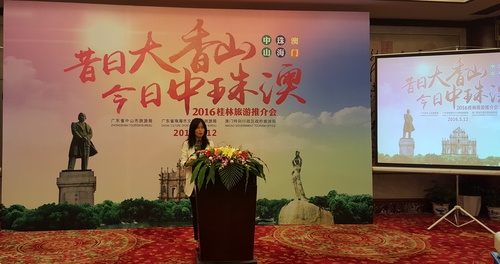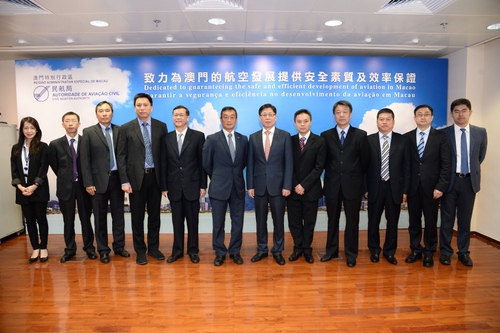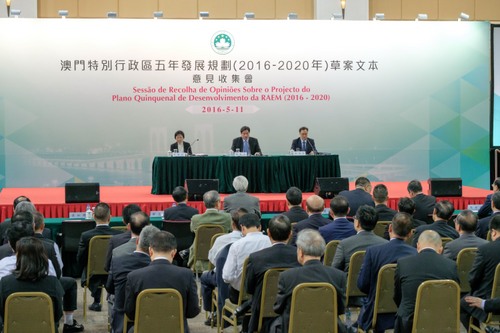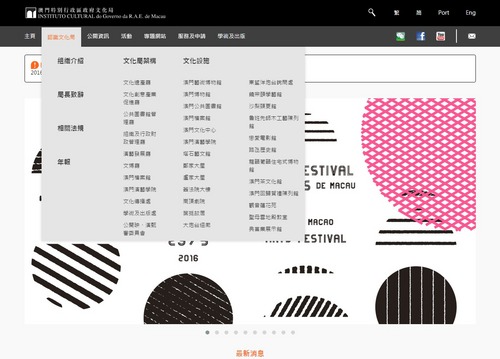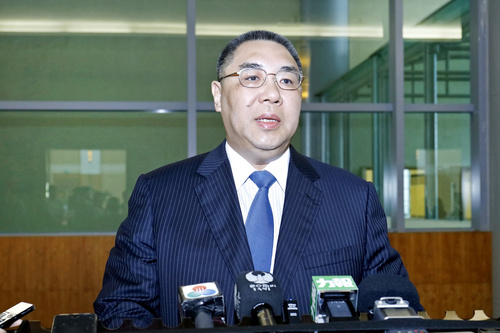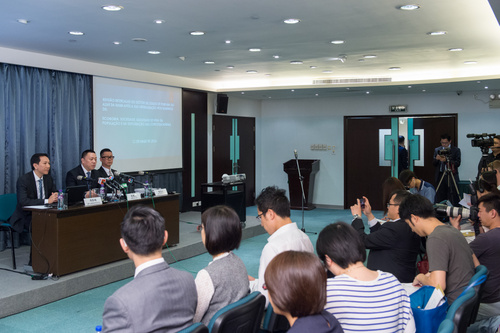Macao SAR Government Portal
News
Survey on vocational training 2015
Information from the Statistics and Census Service (DSEC) indicated that there were 42 institutions offering vocational training courses in 2015, an increase of 11 institutions year-on-year. A total of 1,508 courses were provided, up by 9% year-on-year. Total number of participants rose by 6% year-on-year to 55,841. Participants attending courses in Computing and Health increased by 1,519 and 858 respectively year-on-year, while those in Tourism, gaming & events and Hotels & catering decreased by 612 and 594 respectively. The course completion rate was 87%, down by 1 percentage point year-on-year. Analysed by course type, 34% of the participants (19,058) attended courses in Business & Administration, 13% (7,135) in Language and another 13% (7,018) in Computing. Among the 1,508 vocational training courses, 608 were organized by 15 training institutions on behalf of enterprises or institutions. Number of participants decreased by 6% year-on-year to 24,281, with 45% (11,008) attending courses in Business & Administration, 19% (4,569) in Language and 10% (2,358) in Health. Survey on Vocational Training covers institutions that offered vocational training courses. Information on course types and participants are collected with the aim to understand the provision of and resident participation in vocational training in Macao.
…
Foreign exchange reserves and nominal effective exchange rate index for the pataca – April 2016
The Monetary Authority of Macao announced today that the preliminary estimate of Macao SAR’s foreign exchange reserves amounted to MOP151.8 billion (USD19.00 billion) at the end of April 2016. The reserves decreased by 0.4% from the revised value of MOP152.4 billion (USD19.08 billion) for the previous month. Macao SAR’s foreign exchange reserves at end-April 2016 represented 12 times the currency in circulation or 106.9% of Pataca M2 at end-March 2016. The trade-weighted effective exchange rate index for the pataca dropped 1.04 points month-to-month but rose 0.04 points year-on-year to 104.89 in April 2016, implying that overall speaking, the pataca depreciated against the currencies of Macao’s major trading partners on a monthly basis but appreciated on an annual basis.
…
Tourism authorities of Zhongshan, Zhuhai and Macao visit Nanning and Guilin to expand tourism market along high-speed rail routes
Macao Government Tourism Office (MGTO), Zhongshan Municipal Tourism Bureau and Zhuhai Culture Sports and Tourism Bureau jointly held tourism presentation seminars at Nanning and Guilin in Guangxi Province on 11 and 12 May respectively to promote travel to Zhongshan, Zhuhai and Macao. The three destinations have been making constant efforts to expand their visitor source markets along high-speed rail routes to brand themselves as one regional destination – “Fragrant Hill in the past; Zhongshan, Zhuhai and Macao today” and enhance regional cooperation in tourism. During their mission in Nanning and Guilin, both along the high-speed rail route, Deputy Director of Zhongshan Municipal Tourism Bureau, Dong Zuwen, Deputy Director of Zhuhai Culture Sports and Tourism Bureau, Min Yuntong, and Head of Advertising and Production Division of MGTO, Grace Chen, presented the three destinations’ tourism resources and products together with their travel trade delegates including 15 representatives from Macao’s travel agencies, hotels, ferry operators and so on. The delegation also seized the chance to exchange ideas and discuss business opportunities with travel trade in the two cities, to promote travel to Zhongshan, Zhuhai and Macao in one trip. Capitalizing on the convenience of travel brought by high-speed rail, the three tourism offices have been regularly rolling out joint promotion projects to attract visitors from adjacent regions and cities along High-speed rail routes to the three destinations in one trip to widen the diversity of visitor source markets in concerted effort. The three offices also reached a consensus during the 2015 conclusion meeting of regional cooperation in tourism between Zhongshan, Zhuhai and Macao and the 2016 work meeting in Zhuhai this February, that they will keep promoting their shared image “Fragrant Hill in the past; Zhongshan, Zhuhai and Macao today” and jointly hold promotional activities in various Mainland cities along high-speed rail routes to encourage visitations to the three destinations in one trip. Back in 2006, the tourism authorities of Zhongshan, Zhuhai and Macao signed the “Memorandum of Cooperation in Tourism between Zhongshan, Zhuhai and Macao” to enhance their collaboration in tourism and brand their cities as one regional destination around the theme of Fragrant Hill and Dr. Sun Yat Sen’s life history. The three tourism authorities carried out various joint promotions in a number of countries and regions, including tourism presentations in Chengdu and Chongqing last year. The three offices also promoted multi-destination tour routes together with Tourism Administration of Guangdong Province, Tourism Administration of Guangzhou Municipality and Tourism Administration of Shaoguan Municipality in Malaysia and Singapore last year.
…
China’s aviation authorities visit Macao
The Civil Aviation Administration of China (CAAC) pays a 3-day visit to Macao commencing 12 May 2016 to meet with the Civil Aviation Authority of Macao SAR (AACM) and the aviation industry for exchanging views on enhancing the development of the air transport market between mainland China and Macao. Since aviation started in Macao, CAAC has been rendering support to Macao. Having operated for many years, the air transport market between mainland China and Macao has matured and the routes are operating well. At present, Macao is connected to mainland China by 21 destinations. A total of 9 mainland carriers are flying to Macao. To enhance the exchange between the two sides on the aviation market development, AACM formally invited CAAC in March to pay a visit to Macao. The delegation, led by the Deputy Administrator, Mr. Wang ZhiQing, visited AACM this afternoon after arriving in the territory. The two parties shared with each other the present market operations in the two places. AACM expressed gratitude to CAAC for their long term support on Macao’s aviation market and hoped that CAAC will continue to render support to enhance Macao’s sustainable development in aviation. In addition, AACM also reflected issues on the optimization of air space in the Region: flights at Runway 16 of Macau International Airport are affected by the air space restrictions in the neighbouring area in the way that Macao’s flights cannot perform straight-in approach, the situation of which leads to go-around and diversion problems. AACM expressed the wish to relieve the restrictions by the mainland authorities so that the issue can be resolved. CAAC said they would make consideration on an overall basis. The delegation will visit Air Macau and CAM-Macau International Airport tomorrow to understand the market operations of these two companies.
…
Public sessions to collect opinions on Five-Year Development Plan
The Government will hold several public sessions to collect opinions from residents on the proposal for the Five-Year Development Plan, said the Chief Executive, Mr Chui Sai On. The Government pays great attention to the opinions of the public regarding Macao’s first development blueprint, which covers a period from 2016 to 2020. The Government is currently conducting a two-month long consultation on the proposal. Mr Chui made the comments on Wednesday (11 May) ahead of a consultation session on the Five-Year Development Plan with members of the Chief Executive Election Committee. During the consultation session, the Director of the Policy Research Office, Mr Lao Pun Lap, said the Government aimed to introduce a comprehensive approach to cross-departmental cooperation between public bodies, in order further to enhance the Government’s administrative performance. Major goals of the Five-Year Development Plan include: to maintain Macao’s long-term sustainability; to protect the interests of the country; and to fully adhere to the principle “One country, two systems”, said Mr Lao. The Government would continue to implement policies that contribute to improve the city’s economy and the livelihood of the people, Mr Lao added. During the consultation session, several members of the Chief Executive Election Committee gave their opinion on the proposal for the Five-Year Development Plan. Opinions included suggestions for an annual review mechanism – under the yearly Policy Address – to assess the execution of the Five-Year Development Plan. Some members said that the Government had been conservative when setting the goal for the weight of non-gaming offerings in the overal revenue mix of local resorts; some members said that the city’s six gaming operators should be able to achieve a higher percentage of revenue from non-gaming elements than suggested in the proposal for the Five-Year Development Plan. Some members of the Committee also suggested that the Government should set up a body to monitor the development of Macao as a ‘smart city’ in terms of information technology. Other topics raised during Wednesday’s session included: promoting rule of law; administrative reform; further development of the ‘e-Government’ platform, in reference to the offering of more online services by public bodies; provision of one-stop services by the Government; and the need to review the selection mechanism of members for the Government’s consultative bodies. The Committee’s members additionally said that special attention should to be given to other areas, namely: land resources; urban infrastructure; housing policies; vehicle control; environmental protection; security and safety; cross-boundary contingency plans; nurturing of start-up businesses; youth entrepreneurship; development of the telecommunications sector; further development of Macao’s ‘specialised’ financial services; job protection; upward mobility for local employees; retirement policies; social security; enhanced services and support for people with physical disabilities; and the need to increase the availability of recreational areas in the city. About 160 members of the Chief Executive Election Committee attended the consultation session, held at the Macao East Asian Games Dome. Besides Wednesday’s session, the Committee for Development of the World Centre for Tourism and Leisure has held other seven consultation sessions on the proposal for the Five-Year Development Plan, including with: Macao’s delegates to the 12th National People’s Congress and to the 12th Chinese People’s Political Consultative Conference; members of the Legislative Assembly; members of consultative bodies under the Secretary for Administration and Justice; and representatives of local associations. The two-month long public consultation on the proposal for the Five-Year Development Plan runs until 30 June, inclusive. Members of the public are welcome to contribute their opinions before the end of 30 June via the website of the Committee for Development of the World Centre for Tourism and Leisure (http://www.cccmtl.gov.mo/); or by email to: message@gep.gov.mo; or by post to: Post Office Box No.1201; or by telephone on +853 2882 3610; or by fax to +853 2882 3426; or in person (by prior appointment only) to representatives of the Policy Research Office at Rua do Desporto, No.185-195, Taipa, Macao.
…
Cultural Affairs Bureau renovates webpage keeping URL unchanged
In order to optimize its website, the Cultural Affairs Bureau (IC) launched a new webpage from 12 May. This new webpage is based on a user-friendly design concept, focusing on the search functions of different activities and query services, hoping to build an online communication bridge for improving the quality of its services. The URL of the new webpage of IC (www.icm.gov.mo) remains the same. The new webpage is compatible with the browsing functions of electronic products such as mobile phones and tablets, and the new page layout and design interface is based on a user-friendly design concept. While improving its security, availability and compatibility, the page makes it easy to search for the latest news about cultural events and different thematic websites, providing clear instructions on using various services and applications. The webpage is supported in four languages: traditional Chinese, simplified Chinese, Portuguese and English, respectively. With the addition of social media links including IC’s Wechat, IC’s page on Facebook and Youtube channel, it allows the public to obtain the latest news through following IC’s social media. Since the cultural departments originally under the Civic and Municipal Affairs Bureau have been transferred and merged with IC at the beginning of this year, a new organizational structure has been officially established. The new webpage clearly indicates the cultural resources, divisions and positions after the reorganization, allowing the public to have a better understanding about the organizational structure and functions of the cultural facilities. IC will continue to improve the site functions and structures, and actively develop the latest communication channels, with the purpose of serving the public and building a higher quality of life and cultural network in the city in order to achieve the objective of establishing Macao as a “Culturally Sustainable City”.
…
Mortgage loans statistics – March 2016
According to statistics released today by the Monetary Authority of Macao, new approvals of residential mortgage loans (RMLs) and commercial real estate loans (CRELs) increased simultaneously in March 2016. With regard to the outstanding balance, RMLs and CRELs both witnessed increases. New lending approved In March 2016, new RMLs approved by Macao banks increased by 31.4% month-to-month to MOP3.0 billion; of which, 93.5% was extended to residents. In terms of value, new RMLs to residents and non-residents grew by 33.7% and 5.3% respectively. When compared with the same period of 2015, new approvals of RMLs fell by 39.9%. New RMLs collateralised by uncompleted units (i.e. equitable mortgage) increased by 2.8% month-to-month to MOP0.7 billion. The equitable mortgage extended to residents, which accounted for 81.3% of the total, fell by 3.2%. When compared with the same period of 2015, new RMLs collateralised by uncompleted units decreased by 58.3%. New CRELs grew by 13.8% month-to-month to MOP3.0 billion; of which, 97.7% was granted to residents. In terms of value, new CRELs to residents rose 26.4% whereas those to non-residents dropped 78.0%. On an annual basis, new approvals of CRELs fell by 68.7%. Outstanding balances As at end-March 2016, the outstanding value of RMLs was MOP174.8 billion, an increase of 0.5% from one month earlier or 10.0% from a year ago. The resident component made up 93.7% of the total. Compared to end-February 2016, outstanding RMLs to residents and non-residents rose 0.4% and 1.5% respectively. Concurrently, the outstanding value of CRELs increased by 0.7% month-to-month and 26.5% year-on-year to MOP167.3 billion. Residents accounted for 88.1% of the loans. Compared with one month earlier, outstanding CRELs to residents and non-residents grew by 0.4% and 3.2% respectively. Delinquency ratios At the end of March 2016, the delinquency ratio for RMLs remained virtually unchanged from a month ago or up 0.02 percentage points from a year ago, to 0.09%. The ratio for CRELs was also unchanged from a month ago or down 0.04 percentage points from end-March 2015, to 0.02%.
…
CE: Proper procedures followed regarding donation to Jinan University
The Chief Executive, Mr Chui Sai On, today said Macao Foundation had fully followed and would fully comply with its existing regulations and procedures when it came to handling a planned donation to Jinan University. He said his official positions at Macao Foundation and at Jinan University had not influenced the decision regarding the donation. He added that his official positions with the institutions involved no financial or other personal interest. Mr Chui made his remarks this morning ahead of a consultation session with members of the Chief Executive Election Committee. The session was called to hear the Committee members’ opinions regarding the proposal for Macao’s Five-Year Development Plan covering the period 2016 to 2020. The Chief Executive – under the Articles of the Macao Foundation – heads the Foundation’s Board of Trustees, he said. The Chief Executive is also – by invitation – on the board of directors of Jinan University and of Huaqiao University. In both cases he has the role of vice chairperson. The two educational institutions are under supervision of the Overseas Chinese Affairs Office of the State Council. The Macao Foundation has a set of regulations to handle applications from bodies seeking subsidies: the Board of Trustees makes a collective decision regarding any such application involving more than 500,000 patacas, Mr Chui said. Neither the Chairman of the Board of Trustees – nor Mr Chui as Macao’s Chief Executive – had the power to decide funding for any particular project, he added. There are well-established systems at Macao Foundation in order to avoid – or where necessary to declare – any potential conflict of interest, he stated. The Macao Foundation decided to donate 100 million yuan to Jinan University to help support the building of new facilities in the University’s campus in Guangzhou, Guangdong Province.. Mr Chui said the Jinan University had contributed to the educational development of more than 20,000 young people from Macao over a period of years prior to Macao’s tertiary education system taking its current form. More than half of Macao medical staff – working in the private and the public healthcare sectors – were graduates of Jinan University, he added. In addition, more than 1,900 local young people are now studying at the University. Every year, an average of 300 young people from Macao enrol at the University, he added. The Chief Executive said the Government pays great attention to public opinion, noting such opinion has a role in enhancing the efficiency and quality of administrative processes. Mr Chui also commented on a protest – to be held on Sunday (15 May) – relating to the donation to Jinan University. He said the Government respects the people’s right to freedom of speech, freedom of association, and freedom of assembly. He urged anyone opting to take part in the protest to do so in a safe, lawful and rational manner. In addition, the Office of the Government Spokesperson noted that an article published by a Hong Kong media outlet involved uncorroborated and factually incorrect information about the donation to Jinan University and about the Chief Executive. The Office states the following in relation to the matter: 1. The President of the Administrative Committee of Macao Foundation, Mr Wu Zhiliang, gave full details – via a radio programme on Tuesday (10 May) – on the donation to Jinan University. 2. The Macao Foundation, as always, sets the standards for procedures regarding the handling of applications for subsidy. Jinan University submitted such an application to Macao Foundation in April. The Macao Foundation analysed the University’s application in the following terms: its social utility; the rationale behind the amount requested; the ability of the University properly to manage the subsidy; and other miscellaneous factors. 3. According to the Articles of Macao Foundation, the granting of subsidies is subject to collective decision-making: even the senior officials of Macao Foundation do not have the power individually to decide on the issue. 4. An item in a Hong Kong media outlet suggested a Government-subsidised research on Macao’s medical and healthcare system had linkage to some private business interests of the Chief Executive’s wife. Such commentary is factually incorrect. 5. The news item also suggested that several public contracts awarded for the procurement of medicine and medical facilities had linkage to some private business interests of the Chief Executive’s wife. This is factually incorrect. The Health Bureau had clarified these matters on 2 June 2009 and on 4 June 2009 respectively. 6. Mr Chui Sai Cheong, brother of the Chief Executive, did not have a business interest in projects relating to reconstruction of Tap Seac Square, as had been suggested in the media article. 7. The Education and Youth Affairs Bureau had clarified – on 12 April – the Bureau’s decision to award to a local association some work to produce teaching materials for primary education. The award of such work was within the Bureau’s power, but it required the Chief Executive’s approval because payment for the work spanned more than one financial year. The Office of the Government Spokesperson, as always, respects freedom of speech and freedom of the press and media. The Office nonetheless has a duty to correct or clarify media reports in cases where such reports have no basis in fact or are factually incorrect.
…
DICJ continues to strengthen regulation and supervision to promote healthy development of junket promotion business
Junket promoters play an important role in the gaming industry in Macao. The “Interim Review of Gaming Liberalization for Games of Fortune in Macao: economical, social, livelihood impacts and operating conditions of the Concessionaires” research report stated that the junket promotion business mechanism has its value but existing issues must be recognized. Some of these issues include liberal entry and exit of the market by junket promoters; excessive bargaining power towards gaming operators; credits provided by junket promoters; custody of client’s money or chips; absorption of investment or deposit; and “under the table”, internet or telephone gambling. The report pointed out that the government has further improved its oversight of junket promoters by enhancing the legal system and strengthening supervision and review. The Gaming Inspection and Coordination Bureau (hereafter called as the DICJ) places great importance on the issues identified in the research report and emphasizes on its consistent efforts to legally regulate junket promoters by improving the legal system and enhancing supervision. In October 2015, DICJ issued a guideline on financial accounting system to all junket promoters in Macao. To ensure effective implementation and application of the guideline, DICJ organized explanatory sessions and conducted site visits to facilitate better understanding and compliance by the industry. Meanwhile, routine tasks such as eligibility verification, auditing and compliance monitoring continued. In 2015, out of the 183 junket promoters in Macao, 35 license renewals were refused due to their failure to comply with regulatory requirements. DICJ launched a review on all junket promoters in Macao in February 2016 to examine whether they have strictly adhered to all requirements in the guideline and established a sound financial accounting system. The review is expected to be completed in six months. Until now, DICJ has conducted site visits to approximately 50% of all junket promoters in Macao (over 80 junket promoters). Initial findings have shown that junket promoters were more conscious of their legal compliance since the issuance of the guideline. Most of them have promptly prepared financial statements in accordance with the guideline and maintained closer contact with the gaming operators. For junket promoters who were unable to fulfill the guideline, DICJ has reminded and reiterated to them the legal requirements. Results of the review will be considered during license renewal and be used for examining the application of the existing regulations. Meanwhile, DICJ inspectors will continue to conduct 24-hour monitoring of activities in all casinos in Macao and offer immediate assistance to the appropriate government departments for further actions in accordance with the law, should any criminal activity be involved. DICJ continues to perfect relevant gaming regulations and guidelines, enhancing supervision on the operation and promoting a healthy development of the industry. Amendments to Administrative Regulation No. 6/2002 “Regulate junket promotion activities in casino games of fortune” (“Regula a actividade de promoção de jogos de fortuna ou azar em casino”) have been launched as scheduled, in which the government intends to raise the entry threshold of junket promoters. DICJ will also maintain a close contact with the gaming industry in order to find out a feasible solution to establish a central credit database that complies with legal requirements. This database aims at minimizing the credit risk gaming industry faces when practicing legal granting of credits and maintaining the continuous and healthy operation of the industry. DICJ believes that improved regulation of junket promotion activities and closer communication help promote betterment, quality and integrity of the industry, enhancing the overall image of gaming industry in Macao and its competitiveness at an international level.
…
Synergetic Effect Between Gaming and Non-gaming Elements
To promote synergetic development of gaming and non-gaming elements towards betterment, quality and integrity of the gaming industry is both a social consensus and an endeavour of the Macao SAR Government. As stated in the “Interim Review of Gaming Liberalization for Games of Fortune in Macao: economical, social, livelihood impacts and operating conditions of the Concessionaires” research report, development of the gaming industry has scaled up the added values of its related industries. Non-gaming element has created a large amount of non-gaming job positions. In 2014, non-gaming employees accounted for 44% of the total number of employees in gaming operators. The research report cited data from the six gaming operators, which shown that their non-gaming elements created an income of 23.2 billion MOP in 2014. Currently, total non-gaming spending of tourists in Macao is comparable to that of Las Vegas. However, the percentage is diluted as Macao’s gross gaming revenue is far too high. The report stated that synergetic effect exists between gaming and non-gaming elements. Data has shown that mass gaming revenue accounted for an increasing proportion of the gross gaming revenue in recent years. Driven by the market, non-gaming elements in new investment projects of gaming operators were given an increasing importance with a view to tap into different source markets, such as the middle-class and families. The report analyzed the synergetic effect of the added value of gaming and non-gaming industries. According to the added value calculated using the production approach with current prices in 2003 and 2013 (Production Tax deducted), the added value of the gaming industry increased by (6.9 times), while the hotel industry (11.4 times), wholesale and retail industry (7.4 times), construction industry (5.1 times), banking industry (3.5 times) and catering industry (3 times) all have certain increase. Besides, data has shown that tourists in Macao participating in gaming activities have also contributed to non-gaming spending, such as hotel, catering, retail, entertainment and tourism. On the other hand, tourists attracted by non-gaming elements have in turn driven gaming spending. Impacts of the gaming industry on local economy, business environment of small and medium-sized enterprises (SMEs), society and people’s livelihood are an important topic of the research. The report pointed out that Macao is now among the forefront runners of the most developed regions in the world’s economy thanks to gaming tourism. The most significant positive impact includes: rapid GDP growth, increased fiscal reserves, improved social welfare, foreign investment at record high, increased labour productivity, relatively low unemployment rate sustained, creation of favourable conditions to drive the development of other old or new industries, such as hotel, luxury retail, catering, convention and exhibition, performance and entertainment etc. Gaming liberalisation, in the period of 2002 to 2014, saw a net increase of nearly 35,000 companies in Macao, covering a wide array of industries. Rapid development of the gaming industry has nonetheless brought along negative impact. Relatively obvious were the persistently high inflation rate, putting stress on the daily life of the grassroots and the elderly people, acute rise in housing prices made them unaffordable to the majority of the public, some local SMEs faced difficulties due to the hike in operating costs, gaming-related crime increased, economy and employment became too dependent on gaming industry, the challenging of traditional values and so on.
…


